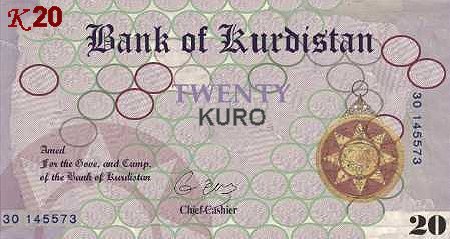An Overview
The Kurdish national currency, KURO, derives its name from linguistic and cultural elements of the Kurdish language. The term KURO is a combination of "Kur," representing the international code for the Kurdish language (KUR) and bibliographic classification, and "O," a common noun-forming suffix in Kurdish. This naming convention follows linguistic patterns found in words such as dillo, hezo, wero, nazo, and delalo.
Denominations and Structure
The Kurdish currency is structured in a decimal system. The smallest unit of KURO is called WIRDE, a term originating from the Kurdish word wirde, meaning "bits" or "small." The exchange ratio is as follows:
- 1 KURO = 100 WIRDE
- A monetary value of 124.36 KURO is read in Kurdish as: Sed u bíst u cuar KURO u sí u shesh WIRDE.

»» Please note that this image is only a sample work for viewing propose.
Understanding Money as a Medium of Exchange
Money, in its fundamental essence, is a social agreement that facilitates trade and economic transactions. This agreement can be:
- Voluntary or enforced
- Fixed or fluctuating over time
- Formal or informal within different communities
Money can exist in various forms, including coins, paper notes, digital assets, and mutual credit systems. Depending on the issuing authority, it can either be backed by a tangible asset (such as gold) or derive its value from the trust in the issuing government or institution.
The Role of National Currency in Economic Stability
National currencies serve as the backbone of modern economies, offering multiple advantages:
- Facilitating trade and commerce
- Enhancing economic growth and development
- Providing financial stability
- Acting as legal tender for all debts, public and private
Historically, national currencies have driven industrial revolutions and led to the development of advanced financial services and banking institutions.
The Bank of Kurdistan (Bankí Nawendí Kurdistan)
The Bank of Kurdistan serves as the central bank of the Federal Republic of Kurdistan. As the core financial institution of the region, it is responsible for:
- Issuing KURO and regulating monetary policy
- Ensuring economic stability and financial security
- Overseeing commercial banking regulations
- Managing inflation and foreign exchange reserves
Although the exact founding date of the Bank of Kurdistan is yet to be confirmed, it plays a pivotal role in Kurdistan’s financial framework, promoting a stable and efficient monetary system as a key contribution to a thriving economy.
Further Reading and Resources
For those interested in exploring the historical and economic aspects of money, the following resources provide valuable insights:
- The Money Museum – A historical perspective on various currencies worldwide.
- The History of Money – Evolution and significance of money in different societies.
- The World of Bank Notes – An overview of global currencies and banknote design.
Prepared by: Dilan MR Roshani (Originally written: January 27, 1996; Updated for Encyclopedic Format)
